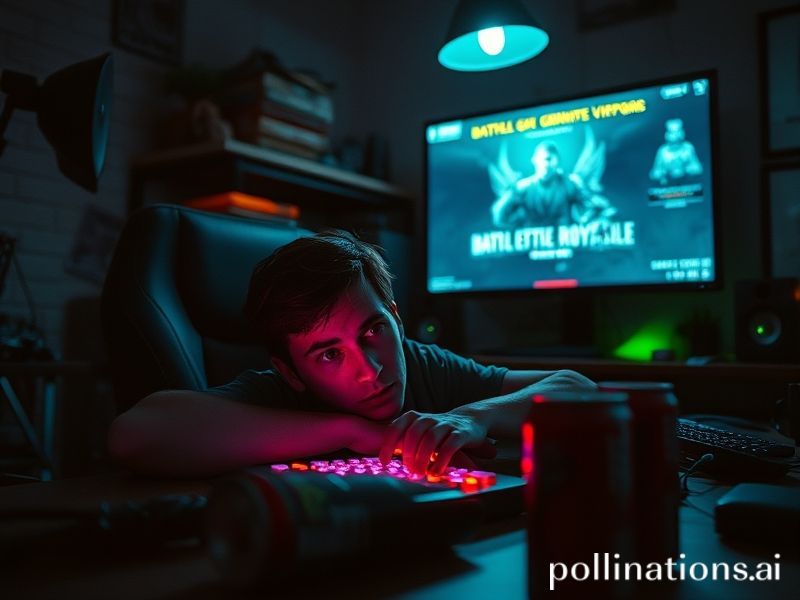Gamer After: How Thumb-Warriors Are Quietly Rebooting the World Order
Gamer After: How the World’s Thumb-Warriors Are Re-Engineering Reality Once the Console Clicks Off
By our man in the cheap seats, somewhere between Reykjavík and regret
In the beginning was the joystick, and the joystick was with the teenager, and the joystick was the teenager. Then the pandemic arrived like an overdue DLC nobody asked for, and suddenly every bored barista from Bogotá to Bishkek discovered that the fastest route out of lockdown was through Azeroth or Verdansk. Two years later the masks are off, inflation is doing its best Elden Ring boss impression, and the planet is stuck asking one question: what happens to a gamer after the credits roll—especially when the gamer now outnumbers the non-gamer in half the world’s parliaments?
Welcome to the “Gamer After,” a demographic hangover now reshaping borders, balance sheets, and bedtime stories. Statistically, the average post-adolescent human has spent 10,000 hours digitally head-shotting strangers before legally ordering a beer. That’s the same duration needed, Malcolm Gladwell smugly reminds us, to become world-class at anything. So congratulations, humanity: we now possess a surplus of virtuoso assassins whose only marketable skill is lag compensation and an encyclopedic knowledge of loot crates. The International Monetary Fund, never one to miss a monetizable pathology, quietly added “esports micro-economy” to its list of systemic risk factors—right under climate change and just above Belgian debt.
Consider South Korea, the canary in the PC bang. The government recently announced a Ministry of Digital Culture; half its staff list reads like a retired Overwatch roster. Their new remit: export K-strategy to the developing world the way they once exported K-pop. In Kenya, mobile-money pioneer M-Pesa has partnered with Riot Games to let street vendors accept LoL tokens for actual yams—because nothing says food security like bartering imaginary dragons for carbohydrates. Meanwhile, the EU is drafting the “Right to Disconnect From Reality Act,” which sounds dystopian until you remember Brussels also classified hummus as a “non-local contaminant.”
The real fun begins when yesterday’s gamers start running tomorrow’s wars. Ukraine’s 2023 counter-offensive was livestreamed on Twitch by drone pilots who learned circle-strafing in Battlefield 4. Their Russian counterparts, raised on pirated copies of the same game, responded with lag-switch tactics straight out of a Moscow internet café circa 2011. The UN called it “hybrid warfare”; everyone under thirty just called it Tuesday. Somewhere in Geneva, a gray-haired delegate Googled “what is teabagging” and required immediate fainting salts.
Back on the civilian front, global HR departments are discovering that leadership skills acquired in guild raids transfer surprisingly well to supply-chain crises. Amazon warehouses now recruit former World of Warcraft raid leaders to coordinate same-day delivery—because if you can herd twenty-five Norwegian insomniacs into killing a pixel dragon at 3 a.m., you can probably get a Roomba to Cincinnati by dusk. The dark punchline? The Danish trade union that once negotiated six-hour workdays is now demanding “bio-break clauses” for employees stuck in six-hour Zoom calls that feel suspiciously like Molten Core.
Even death has been gamified. In Mexico City, the startup EterniQuest offers to NPC-ify your deceased abuela inside a bespoke Animal Crossing island, complete with daily gossip and passive-aggressive remarks about your lawn. Marketed as “grief tech,” it monetizes denial at $9.99 a month—slightly less than Spotify Premium and arguably more therapeutic. The Vatican, sensing both sin and revenue, is debating whether virtual resurrection counts as idolatry or merely DLC.
And yet, beneath the snark and skinner-box economics, the Gamer After carries a faintly utopian aftertaste. When Saudi Arabia’s sovereign wealth fund bought ESL Gaming for a cool billion, the transaction came with a side quest: female esports visas that don’t require male guardianship. Progress, like a loot drop, is random and sometimes crap, but occasionally it’s legendary. In Manila, an entire generation of kids who once sold cigarettes in traffic now coach Valorant teams for American teens who’ve never seen a jeepney. The irony—that outsourcing now flows both ways—would be delicious if it weren’t also dinner.
So here we are, citizens of a planet where the highest-grossing entertainment product in history is still a six-year-old game about carjacking, and where the phrase “get a life” has been replaced by “get a server.” The Gamer After isn’t a subculture anymore; it’s the operating system. And like every OS, it needs patches, anti-virus, and the occasional hard reboot. Whether humanity presses Continue or Game Over is still loading, but one thing is certain: the next level will be pay-to-win, the loot boxes will be geopolitical, and the final boss is probably us—with a laggy connection and a mic that never quite works when it matters.







